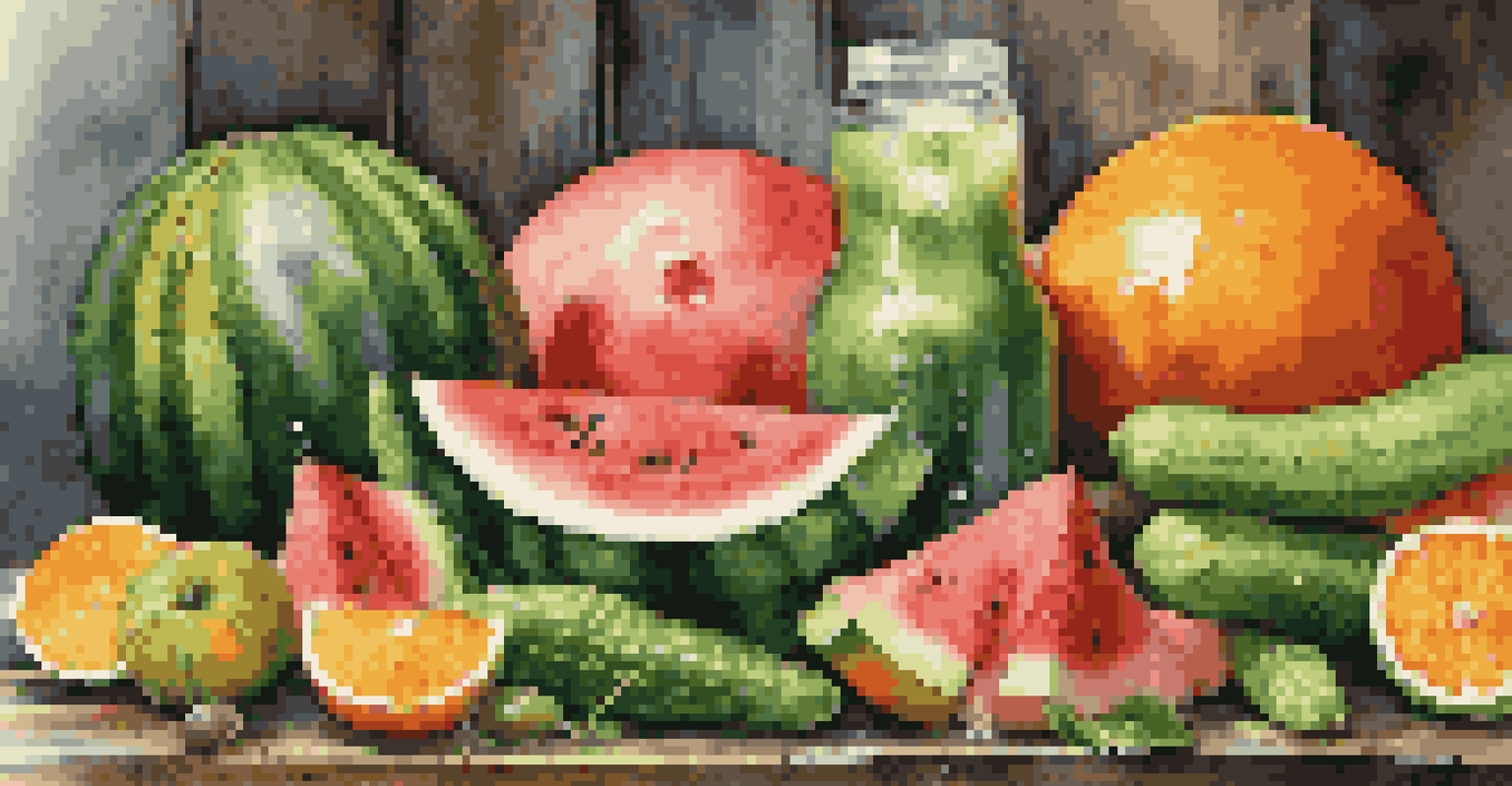Traveling While Pregnant: Dietary Tips for Expecting Mothers

Understanding Nutritional Needs During Pregnancy
When traveling while pregnant, it's crucial to understand your nutritional needs. Your body is working hard to support both you and your developing baby, which means a balanced diet is more important than ever. Essential nutrients include folic acid, iron, calcium, and protein, all of which play a vital role in fetal development and maternal health.
Eating well is a form of self-respect.
For instance, folic acid helps prevent neural tube defects, making foods like leafy greens and fortified cereals a must. Iron, found in red meat and beans, is important for increased blood volume, while calcium from dairy products supports the development of the baby's bones and teeth. Keeping these nutrients in mind will help you make informed food choices during your travels.
By planning ahead, you can ensure that you have access to the right foods while on the go. This might mean packing healthy snacks or researching restaurants in advance to find options that meet your dietary needs. Remember, it’s not just about eating; it’s about eating wisely for both you and your little one.
Hydration: The Key to a Healthy Pregnancy
Staying hydrated is especially important during pregnancy, and it becomes even more crucial when you're traveling. Water helps to support the increased blood volume and can alleviate some common pregnancy discomforts like swelling and fatigue. Aim for at least 8-10 glasses of water a day, and consider bringing a reusable water bottle with you to make it easier to stay on track.

When traveling, especially in hot climates, dehydration can sneak up on you. Signs of dehydration include dry mouth, fatigue, and dizziness, which can all be exacerbated by the stresses of travel. So, make it a habit to sip water regularly, even if you don’t feel thirsty.
Prioritize Nutritional Needs
It's essential to focus on vital nutrients like folic acid, iron, and calcium during pregnancy for both maternal health and fetal development.
In addition to plain water, consider incorporating hydrating foods into your diet, such as fruits and vegetables. Watermelon, cucumber, and oranges are not only refreshing but also packed with vitamins. This approach can help keep your fluid intake enjoyable and varied.
Choosing Safe Foods While Traveling
When on the road or in a new destination, food safety is paramount for pregnant travelers. Avoid undercooked meats, unpasteurized dairy products, and raw seafood, as these can pose risks to both you and your baby. It's essential to be mindful of where and what you eat to prevent foodborne illnesses.
Water is the driving force of all nature.
If you're dining out, opt for well-cooked meals and avoid street food unless you're confident about its safety. A good rule of thumb is to choose restaurants that look clean and busy, as high turnover usually indicates fresher food. Don't hesitate to ask questions about how food is prepared—it’s your right as a consumer.
Additionally, when traveling internationally, be cautious with tap water. It’s often safer to drink bottled water or use water purification methods. Keeping these food safety tips in mind will help ensure that your travels are enjoyable and healthy.
Pack Healthy Snacks for Your Journey
Packing your own snacks is a smart way to maintain a healthy diet while traveling during pregnancy. Snacks like nuts, whole grain crackers, yogurt, and dried fruit are not only nutritious but also convenient. They can help keep your energy levels stable and curb hunger between meals.
When you have healthy options readily available, you're less likely to be tempted by less nutritious choices at airports or rest stops. Plus, having snacks on hand can help you avoid those awkward moments of searching for food when you're feeling famished.
Stay Hydrated While Traveling
Maintaining hydration is crucial during pregnancy, especially when traveling, to support increased blood volume and alleviate discomfort.
Consider preparing a small cooler or snack bag before your trip. This allows you to control what you eat and ensures you have options that align with your dietary needs. A little preparation can go a long way in making your journey more enjoyable.
Mindful Eating: Listening to Your Body
Traveling can throw off your usual eating routine, but it's important to practice mindful eating during this time. Paying attention to your hunger cues and eating when you're hungry can prevent overeating and help you feel more satisfied. It's easy to forget to eat when you're busy exploring, so be intentional about making time for meals.
Mindful eating also involves savoring your food. Take the time to enjoy the flavors and textures of your meals, which can enhance your overall dining experience. This approach can also help you make healthier choices, as you'll be more in tune with what your body truly needs.
Lastly, don’t be too hard on yourself if you indulge occasionally. Traveling is about enjoyment as well, so allow yourself the flexibility to try local cuisines. Balance is key, and as long as you’re mostly making healthy choices, a treat now and then won’t hurt.
Supplements: Enhancing Your Diet While Traveling
While a well-rounded diet is essential, sometimes it’s tough to get all the nutrients you need while traveling. This is where prenatal vitamins come into play. They can help fill any nutritional gaps and support your health and your baby's development, especially if you find it challenging to eat a balanced diet on the road.
Before your trip, talk to your healthcare provider about the right supplements for your specific needs. They can guide you on what to take and how to incorporate them into your travel routine. This can offer peace of mind knowing you're doing your best to support your pregnancy.
Consult Healthcare Providers
Before traveling, consulting with healthcare providers ensures personalized advice on safety and dietary needs during pregnancy.
Incorporating supplements doesn't mean you should skip healthy eating altogether. Rather, think of them as a safety net that complements your diet. Maintaining that balance will help ensure both you and your baby receive optimal nutrition throughout your travels.
Consulting with Healthcare Providers Before You Travel
Before embarking on your journey, it's a wise idea to consult with your healthcare provider. They can help assess whether it's safe for you to travel based on your specific circumstances, such as your health and pregnancy stage. Knowing your limits will help you plan a safe and enjoyable trip.
Additionally, your provider can offer personalized dietary recommendations tailored to your needs. They might suggest specific snacks to pack or meals to focus on based on your health profile. This guidance can be invaluable in ensuring you stay healthy while traveling.

Don’t forget to keep your provider's contact information handy during your trip, just in case you have questions or concerns. Being prepared can help you feel more at ease and confident as you travel while expecting.